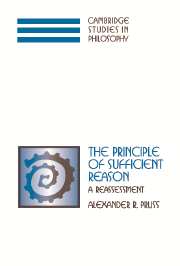Book contents
- Frontmatter
- Contents
- Acknowledgments
- Part I The Principle of Sufficient Reason and the Causal Principle
- Part II Objections to the PSR
- 4 A Modern Version of the Hume Objection
- 5 The Anti-theological Argument That There Are No Necessary Beings
- 6 Modal Fatalism
- 7 Free Will
- 8 Quantum Mechanics
- 9 Turning Leibniz against the PSR
- 10 What Survives the Criticisms of the PSR?
- Part III Justifications of the PSR
- Bibliography
- Index
5 - The Anti-theological Argument That There Are No Necessary Beings
Published online by Cambridge University Press: 27 July 2009
- Frontmatter
- Contents
- Acknowledgments
- Part I The Principle of Sufficient Reason and the Causal Principle
- Part II Objections to the PSR
- 4 A Modern Version of the Hume Objection
- 5 The Anti-theological Argument That There Are No Necessary Beings
- 6 Modal Fatalism
- 7 Free Will
- 8 Quantum Mechanics
- 9 Turning Leibniz against the PSR
- 10 What Survives the Criticisms of the PSR?
- Part III Justifications of the PSR
- Bibliography
- Index
Summary
COSMOLOGICAL ARGUMENTS
One objection to the PSR is that it is simply false because it entails the existence of a causally efficacious necessary being. Consider applying the PSR (or, in the third case, a version of the CP) to one of these:
(30) The proposition that there exists at least one contingent being
(31) The conjunction of all contingent true propositions
(32) The contingent existence of the actual aggregate of all contingent beings (i.e., of the universe)
All of these explananda have the property that any explanans must entail the existence of a causally efficacious necessary being. The explanation of why there is a contingent being or why the aggregate of all contingent beings exists cannot itself, at the pain of circularity, proceed by citing the causal efficacy of any contingent being.
The case of the conjunction of all contingent true propositions – call this conjunction the Big Conjunctive Contingent Fact (BCCF) – takes a little bit more thought. Swinburne (1968) has argued that human beings have available only two kinds of explanations (as a friendly amendment we may add, in addition to reductive explanation): scientific explanations in terms of boundary conditions and laws and personal explanation in terms of the free activity of a person. No scientific explanation of the BCCF can be given, assuming for now that the laws are contingent – alternate proposals will be discussed in Sections 5.3.2 and 5.6.
- Type
- Chapter
- Information
- The Principle of Sufficient ReasonA Reassessment, pp. 82 - 96Publisher: Cambridge University PressPrint publication year: 2006



